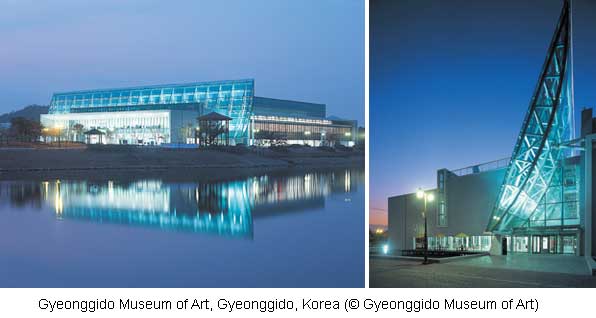Wednesday, September 19th, 2007
LIVE FROM CAMOUFLASH: Artist Organized Art will be reporting from Poland at Camouflash,
an international artists meeting event and exhibition to be held at the
Patio Art Center, of The Academy of Humanities and Economics, in Łódź, Poland.
The show will take place 12-27 October 2007, opening on friday, 12 October.
Stay posted for coverage, documentation, commentary, interviews and more.
International Artists Meeting
12 – 27 października 2007
curator: Mariusz Sołtysik
rationale: The contemporary culture is rather pictorial in nature, idea has been marginalised. The plethora of pictures in our lives induces a sense of being lost, or immunises us against them by creating and augmenting trite reception of such pictures, which, consequently, makes them neutral (e.g. another murder). Obviously, such trite and superficial reception is also true of religion, art and its products. On the other hand, noticeable social behaviours indicate an urge to appear in the media in a short flash of an advertisement or reality show. This urge replaces the essential question: “what idea do I want to pass across?” or “what is my principal message?” People appear to participate in the social and cultural life, but on the level of entertainment, rather than inclusion or reflection on human existence. The present-day society seems to be complex, however, following the thought of Jean Baudrillard, it is rather a mass that is “an opaque nebula whose growing density absorbs all the surrounding energy (…), to collapse finally under its own weight. A black hole which engulfs the social.” Before the black whole is formed, however, there is a short, yet spectacular explosion, followed by a collapse of a massive star. Relating this to human behaviours, perhaps this flash is the one and only opportunity to step out of obscurity before disappearing and being absorbed by the mass? To what extent, then, is this flash true and is not a camouflage, a desire to be somebody else for a moment? It seems that just to induce the question “who am I and what am I doing?” is in itself a great success. Mariusz Soltysik The Camouflash
artists:
Janusz Baldyga – Poland; Olga Bergman – Iceland; Charlie Citron – Nederland;
Martina Galvin – Ireland; Kristaps Gulbis – Latvia; Shilpa Gupta – India;
Jessica Higgins – USA; Gabriele Horndasch – Germany; Ahn Hyun-Ju – Germany;
Eric Van Hove – Belgium; Adam Klimczak – Poland; Erika Knerr – USA;
Anna MacLeod – Ireland; Christine Mackey – Ireland; Tomasz Matuszak – Poland;
Aisling O’Beirn – Northern Ireland; Mariusz “Benek” Olszewski – Poland;
Mariusz Sołtysik – Poland; Ewa Szczyrek-Potocka – Poland; Suzy Sureck – USA;
Richard Thomas – Australia; Miyuki Yokomizo – Japan and others…
#permalink posted by Erika Knerr: 9/19/07 10:02:00 PMThursday, September 13th, 2007
Dokumenta, Kassel, Germany, 6.16-9.23.07
artist Susannah Auferoth revisits
DOKUMENTA 12Expecting to encounter a huge global audience speaking unidentifiable languages, my German husband Dirk and I drove from Münster to Kassel to attend Dokumenta 12. Instead we found a rather sedate, socks-with-sandals crowd which gave us loads of time to peruse the actual art and grounds.
The exhibition is very post-war German in it’s presentation; sincere, exploratory, and with a bit of precise humor. Dokumenta is set in six buildings in the city of Kassel, most within walking distance of each other, the exception being the Schloss Wilhelmshöhe set within the Bergpark. There is one other building taking part in Dokumenta this year in Roses, Spain which we didn’t see.
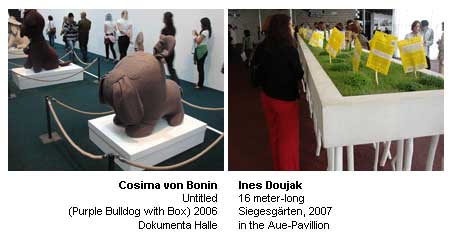
In Museum Fridericianum, the first venue we visited, I was immediately drawn to Hu Xiaoyuan’s delicate and creepy hair-of-the-artist embroidery on white silk (wooden embroidery rings still in place) bearing images of lips, peacocks; flora. It occurred to me that a lot of art making, my own included, could pass for small slices of OCD fixations. Not far from that stands Zheng Guogu‘s rectangular waterfall of wax-dipped calligraphic texts culled from amateur (ie non-elite) calligraphers. Serene and stylized, the wax drips formed shapes reminiscent of ancient Chinese depictions of wave spray and mountain trees, and, possibly, Scooby-Doo graphics.
Moving on, we encountered Iole De Freitas’ large steel and plexiglass panels swooping through the formal space and appearing to penetrate the walls and hover along the facade. It occurred to me as I ducked over and around the barriers that I was following a persons line of sight which led both Dirk and I to consider that it worked as a segue for the next rooms artwork, which, it so happens, we have forgotten.
Die grosse Ausstellung hat keine Form, hence the works were scattered chronologically, geographically, and…..it worked! Once you stop yourself from trying immediately to answer who-what-why-where you enter into the Dokumenta 12 zone and accept willingly all things presented. If you fight it, fatigue will set in. Are those soggy puzzle pieces in front of Dokumenta Halle part of the show?
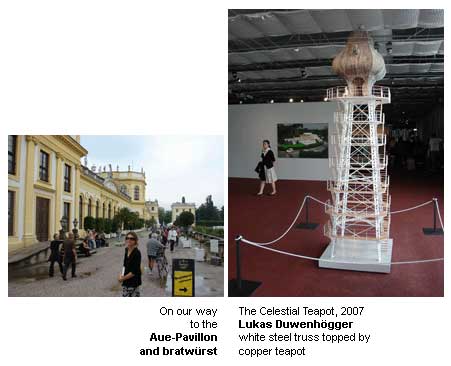
While in the midst of Iñigo Manglano-Ovalle’s Phantom Truck installation in the Dokumeta Halle, Dirk and I both shuddered and said ‘WMD’ to one another. We moved on and found the exhibition deeper than we ever imagined. I wanted to have sleepover in the Aue-Pavillion, even more so after I accidentally walked into Gerwald Rockenshaub’s artwork which was soft and large and warm. (thought bubble: Dokumenta as sleep-over space) Monika Baer’s large eerie vampire painting gave us pause. Dirk spent time trying to decipher her vaporous iconography while I wondered about the use of Prussian blue and the Brothers Grimm, who wrote many of their stories in Kassel.
One wonderful addition to the entire exhibition was Ai Weiwei’s 1001 Quing dynasty chairs placed in small conversational groupings throughout the venues. Almost too good to be true, you were allowed to sit on them. They had been used to form part of a Fairytale event (again, Brothers Grimm) where Chinese citizens were invited to a taste of non-China. I did not witness the event but sat in these beautifully-formed wooden chairs staring directly into the eyes of other weary, culture-soaked attendees. The intimacy was palpable and, therefore, nicely comical.
Romuald Hazoumé constructed a boat out of plastic cannisters for his Dream installation. The boat won’t float: it’s full of gaping holes from the cannister openings. The piece reminded Dirk and I of being on a almost deserted tropical island and discovering a white sand beach covered with hundreds of seaweed-covered plastic cannisters.
Containers and what they contain…what different societies carry on their backs. That’s very much the gist of the show right there.
Susannah Auferoth
#permalink posted by Susannah Auferoth: 9/13/07 09:12:00 PMThursday, August 23rd, 2007
Lincoln Center Out Of Doors
Elaine Summers
The Hidden Forest
August 23 ‘07, New York City
Choreographer: Elaine Summers
Dancers: Dale Andree, Joshua Bisset, Harriet Bograd, Meg Chang, Jessica Higgins, Kiori Kawai, Thomas Kortvelyessy, Laura Quattrocchi
Composers/Musicians: Pauline Oliveros, Jay Clayton, Thomas Houser, Carman Moore, Ann Hurley, Lotte Arnsbjerg
Artists: Alison Knowles, Davidson Gigliotti, Murphy Gigliotti, Taketo Shimada, Laura Quattrocchi, Miana Grafals
Assistant Choreographer: Rebecca Loukes
Budget/ Accounting: Debbie Goldberg
Production Designer: Murphy Gigliotti
Organizational Consultant to Miss Summers: Meg Chang
Communications: Jonathan Gill, Cody Hughs
The influential intermedia artist Elaine Summers performed her new work “Hidden Forest” at Lincoln center on August 23rd during twilight. I was one of the eight diverse dancers to participate in the alcove of trees and inside Elaine’s images of dancers floating among the leaves and weather balloons.
During the previous months Elaine began the process in her loft with balls of many shapes, sizes, textures and colors. I often felt that her in depth anatomical and healer’s knowledge could scale to a planetary dimension. She would work with a dancer’s injuries and then spark their kinesthetic imagination. Elaine innovated much of her vision within the framework of the unique qualities that each dancer had. She spoke many times of Dante, of a hidden forest, which inspired her work:
“Midway in the journey of this life
I came upon a dark forest,
Where the path was lost.”
As time rolled by she mesmerized us as only Elaine Summer’s can as we watched her visions of forest and creatures from our context. We were visible and invisible, darting and spinning, and images or sparkles seemed to flash by.

Dale Andree missing – apologies, we wish we could find her pic.
She is a wonderful dancer.
#permalink posted by Jessica Higgins: 8/23/07 08:22:00 PMTuesday, August 21st, 2007
“AIRS DE PARIS” CENTRE POMPIDOUcorrespondent: NY Media Artist Angie Eng
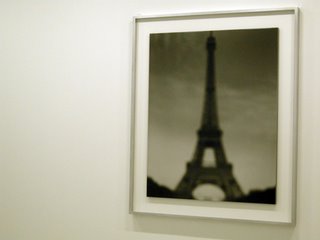 Hiroshi Sugimoto, ” Eiffel Tower” 1998“Airs De Paris”25 April-15 August 2007Centre Pompidouwww.centrepompidou.frReflections: Angie Eng, Media Artist New York CityInstalled in Paris for summer 2007
Hiroshi Sugimoto, ” Eiffel Tower” 1998“Airs De Paris”25 April-15 August 2007Centre Pompidouwww.centrepompidou.frReflections: Angie Eng, Media Artist New York CityInstalled in Paris for summer 2007The cherry normally sits in the center on the top, a bright red, small, but like a ruby in grey, we notice it, toute suite in order to recognize- yes! Now it is a cake! Alfred Pacquement along with Christine Macel, Daniel Birnbaum decided to use as the show’s centerpiece, Duchamp’s ‘Airs de Paris’, a glass ornament gift engraved from both himself as Marcel and his nom de guerre, Rrose Selavy. Why would an artist sign with both names is a mystery, much like the themes, sub-themes, side-themes and cross-themes of this capital-C City exhibit. Not Surrealism, Not a conversation piece, (perhaps gifts play some part in this institutional exhibit of over 100 artists), Not not a sign of postmodern thinkers, this exhibit is a grand example of a quasi-anarchistic approach of Urbanism à la OMA and Radical Post-planning Asian Urbanism. In ‘Airs de Paris’ don’t expect breathing room, fountains in the square, a linear story, order, think Medieval Paris with royalty situated next to squatters, torture and eloquence, romance and drab, the intellectual and the idiot. Et voilà- French culture breeds double entendres and the artists, curators, installers take the liberty to interpret ‘Airs’ as true Urbanites in a glutinous mélange of creativity, leaving their guests with a bit of indigestion.
Rule number 1 in the Age of the Curator: When experiencing an institutional art show consider the text on the wall as yet another art piece. Wall text describes this is a show about Paris OR the chosen artists work/know/visit/ live in Paris. The latter more prevalent when one considers the artist roster. I recommend the visitor experience these blocks of black symbols like New York City parking regulation signage that leaves the driver in stop-motion perplexity. And parked at the entrance sits Orozco’s redesigned, re-functionalized Citroen 1970. Put the hit on the first or second track. But as we all know the true gems are really on the B-side. However, if we skip the introductory room where the actual cherry sits amongst distracting black ceiling goo and the reduction of On Kawara’s ‘Today Series’ you will be welcomed with Pierre Huyghe’s simulacra photo of Gordon Matta-Clark’s 1974 film screened on the adjacent wall. Unfortunately, we don’t get to experience one of Matta-Clark’s exterior desecrations, however one will soon discover that the exploding real-estate market has permeated the museum walls and each artist is slotted about 10 square meters. My impression that European shows are much more sensitive to giving the art object critical space in between, went out the door. Being a New Yorker with bionic over-sensory filters, I could adapt to the occasion and enjoy a few select œuvres.
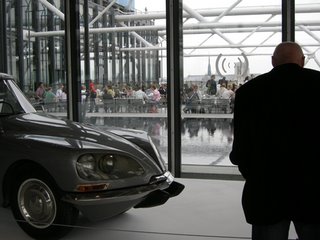 Gabriel Orozco, “La D.S.” 1970
Gabriel Orozco, “La D.S.” 1970In contrast, but equally promising, we are led to box number #3 with Daniel Buren’s Xavier Veihan’s ‘La Cabane éclatee au Paysagés Fantômes, 2006-07’ (No need to translate as it sounds much better in French) These two urbanites are clever to create a solution to bring the illusion of nature inside our lives and at the very least to remind us amongst the simulated and built environment we have a faint memory of the organic. The next course is Valerie Jouve’s self-conscious eye of beautiful roaming city compositions, a similar aesthetic to a Chris Marker dérive.
By the 4th course it hit me that this is not French, but Fusion cuisine! A newly constructed wall is placed in the middle of the room entitled ‘Free Space…” Carefully in the center is a Banksy-styled graffiti work by Mircea Cantor. Its preciousness irritated me in the name of Graffiti Art. The piece would have exponentially gained merit had it been sprayed on one of those glorious blue tubes on the exterior of the Pompidou. Her other work, a light box photo with the words ‘unpredictable future’ written on a misty window is a process yet to be exploited. I had an image of the artist directly connected with weather. She could only execute work in cold temperatures. The over-heated rooms creating condensation on the windows. Time would be critical. Her canvas available for a very short period of time. She would have to run from place to place writing temporal messages on store and car windows. Delivery is key. And even the other notable artist in this room, Jean-Luc Moulène cheats himself by installing a periodical entitled, ‘Le Tunnel’ as an object. This poetic work takes the form of newsprint, a beautiful nostalgic medium. Somehow the crate of stacked newspapers and each paper taped to the wall, lose the identity of the piece. A curatorial choice? Surely this couldn’t be the idea of the artist to re-CONtextualize his words and reverse his modus operandi.
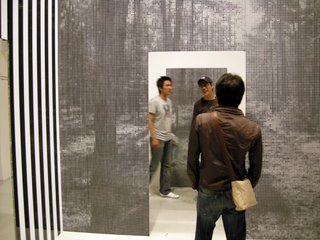 Daniel Buren and Xavier Veihan
Daniel Buren and Xavier Veihan
“La Cabane Eclatée au Paysagés Fantômes” 2006-07In global exchange, an anarchic (let’s be nicer) in a more organic fashion, isn’t copyright a moot point? The moderrn eye searching for an original idea in a contemporary vista will be blinded. Rainier Lericolais’ electro-pop music with the accompanying statement ‘to subvert the system’ providing his music free on-line is questionable in intent. Now if he were to raise € 30.000 in art grants to make a CD and distribute 20,000 copies in a newspaper for free, now we are talking ‘Free Space…’
On the B-side we are welcomed with Chris Marker’s ‘Zapping Zone.’ Made 25 years after Nam June Paik’s television symphonies, nonetheless this media orchestra is a visual-audio mirror of split second information delivery. 35 years af
ter the onset of the digital age, we witness how the brains of our children process information. Beauty would not need to be repeated, as we would find beauty in repetition. In Thomas Hirschorn’s ‘Outgrowth’ 2005 I feel human again. Like a taxidermist reconfiguring animals with malignant tumors, Hirschorn constructs paper globes each with their war-torn cancerous growths. Newspaper clippings hang under each shelf to provide reference of where and when each growth appeared. Anxiety is highlighted by the masking tape that crudely shapes each deformation. Light yet rich in subject, contemporary and reminiscent, reflective without pomp I could end the meal here. Perhaps mentally, emotionally, physically I did. The music played on for another good 6 courses. After this point, I was half listening.
Identity Room 8- a colored ghetto. Didn’t we do this in the late 80’s early 90’s? An honorable mention is Huang Yong Ping’s ‘Carte du Monde’ 2006-2046. A globe sitting naked in the corner is pealed like an orange. Its endless peal spreads across the wall. Like a palm-reader Huang pins MISfortunes to hotspots on localities.
Although there was endless chatter, I could catch a few smart dialogues. My interest lay in the hands of the more experienced and wiser. Hiroshi Sugimoto and Sophie Calle, much like Buren-Veihan and Matta-Clark/Huyghe teamed up and found a way to make memorable statements in a dizzying atmosphere. Sugimoto in his dreamy extreme slow shutter aesthetic would select his ’98 Eiffel Tower (oh yes, the show about Paris) and Calle’s 1979 journal entry ‘Tour Eiffel’ would leave as a pair. However another duo, Louis Bourgeois’ marble curved houses enclosed by Koo Jeong-a’s 1001 drawings was just plain wrong. Have we been reduced to the approach of matching the sofa with the painting? Artists, we can’t be pushed around like this!
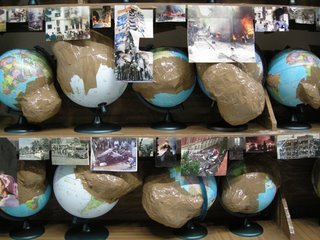 Thomas Hirschorn, “Outgrowth” 2005
Thomas Hirschorn, “Outgrowth” 2005Yes, I’m exhausted at this point but I must save energy as my peers have a piece at the end of the tunnel. But before I reach them, I am pleasantly awoken by Philipe Rahms’ psychological sound room, ‘Diurnisme’ A bright yellow James Turrellesque light emanates from another team of artists’ designed felt wall. You enter a hyper-sensory room that simulates night time when the brain is producing melatonin. Sitting inside John Field’s ‘Nocturnes for Piano’, believe it or not, in the blinding light the visitor feels at rest. Thank you.
So where are my peers? He-He Associates (Helen Evans and Heiko Hansen) an English and German duo installed in Paris are working on digital visualizations of nature rejuvenated and damaged. Had I not the postcard, I would have never found their piece installed in a small window, the view of Paris altered by a transparent digital screen communicating with ‘Airparif’ to measure the level of air pollution. I recall having seen something similar in a lab in Santa Barbara, when as a poor college student I was hired for $8/hour to go on a treadmill in a enclosed room as the air quality increased in pollutants. One could see the pollution levels on graphs, numbers, colors, etc. In the digital age the role of the artist has been rediscovered with many artists now collaborating with scientists. I could imagine the screen was pricey, but couldn’t help think that the project would be more effective installed in the café windows where people leisurely tried to enjoy the view. Again in a large exhibition and no fault of the individual artist, context is sacrificed and the works suffer.
The architecture/design room arrives unfashionably one hour late. However, the brilliance of Zaha Hadid is side-noted, the infrared hot air balloon interesting inside its trade show installation. Like most summer group exhibitions, this one also leaves you exhausted in search for the exit. As an experience, I did feel as if I were in a City- anonymous, sensory-charged, crowded, over-exposed. Surpassing my limit, I’m in great need of a digestive. Although stimulated, I’m happy that not all cities are like the ‘Airs de Paris’ and I head toward a quiet intimate corner of the Parisian café to take my espresso.
#permalink posted by Angie Eng: 8/21/07 03:38:00 AMThursday, August 9th, 2007
NAM JUNE PAIK EXHIBITION
PROGRAMMING OF GYEONGGIDO MUSEUM OF ART;
OPENING OF NAM JUNE PAIK EXHIBITION
Interview with Kim Hong-hee
About Gyeonggido Museum of Art and Nam June Paik Rhapsody in Video:
There is a new contemporary art museum in Gyeonggido, Korea. Gyeonggido surrounds Seoul and is one of the largest and most affluent provinces in Korea. As the first invited director of this museum, Kim Hong-hee speaks about her visions for the museum. Furthermore, as the artistic director for the KBS (Korean Broadcasting Station) 80th Anniversary Special Exhibition Nam June Paik Rhapsody in Video, she speaks about staging Paik’s artworks of the 90’s, his golden years.
August 8, 2007 by Mina Cheon
MC: Please talk about the local/global concerns for the Gyeonggido museum. As a local museum, how are you planning on shaping the museum’s goals and visions for the future?
KHH: I am interested in researching international museums that hold reign as significant local museums as well as being international (such as the Louisiana Museum in Denmark) and rather than starting relationships with mainstream museums of North American and central Europe, the network will start with museums of Scandinavia or Latin America, for example, museums that signify periphery as a strategy. Due to the fact that Gyeonggido is in the suburb of Seoul, I take that as the theme for the vision of the future museum where the peripheral space gains attention for its regional concerns and builds on being global afterwards. At the same time, the international programming will hopefully bring cultural exchange from other locations so that the museum can illuminate and educate the public in diverse ways. Furthermore, there are a lot of local families that visit the museum and the outdoor park that surrounds it, so it is a great opportunity to have a public outdoor landmark with the museum.
MC: You mention the importance of the programming; would you talk more about that?
KHH: The main features of the exhibition will be an annual exhibition that is dedicated to exploring themes of the province such as the one we had this year, the sculpture garden and green project Line in Space: 2007 Sculpture Project, and then the goal is to develop the museum’s programming with project-based events, residencies, and international exchange programs. All of this is to create a national and international, local and global museum, which places activity and liveliness ahead of anything else. Furthermore, there are some things that are seasonal to consider, for example, the summer time is an important exhibition time for youngsters so this year, we are currently showing Charge Your Imagination exhibition which displays contemporary Korean artists with artworks that are visually and conceptually stimulating as well as with some artworks that can be touched and climbed on. Essentially, what makes the Gyeonggido Museum different is that the museum’s main focus and attention, the energy and resource, is on the programming, which will change each year and be worked on and researched. Hence, the museum is directed towards a movement forward.
MC: Many international museums house collections which are essentially the same (blockbuster pre-modern to modern artworks), how is this museum different, what does it house, and how will you maintain a program based museum rather than collection based museum?
KHH: The Gyeonggido Museum is a museum that focuses more on programming (active) and also intends to house a contemporary collection that fits the identity of the museum. The museum already has about 200 contemporary art works and we have currently provided touring exhibitions from this collection, which travels around Gyeonggido.
MC: Let’s talk about the Nam June Paik exhibition at KBS. I found your exhibition interesting since it was exhibited at KBS rather than a museum and because it was a site-specific exhibition, can you speak more about the exhibition layout, staging, and theatrics of Paik’s artwork for the exhibition Rhapsody in Video?
KHH: I wanted the exhibition not to be a retrospective of Paik’s work but for it to highlight his golden years, the 90’s, where his work was in my opinion, most elaborate and sensational. I wanted to dedicate the exhibition to this time period that highlighted his multiple monitors’ series. One way to do this was to dim the lights and have a dark exhibition space. The light level accentuates the light in the screens while the space was bright enough for the sculptural component of the work not to be missed as well. Although Paik’s earlier works are complimented more, some people say they were more meditative and technologically experimental, Paik’s work of the later years needs to be recognized as being fantastic and different from the earlier period. Some say that his multi-monitor gave an impression of a type of Paik-mannerism, but what I wanted to convey is the power in such works. They are fantastic, heroic, and poetic, hence the title Rhapsody in Video. Moreover, just like his constantly changing video, the pieces are not meant to be seen in a glance or from one perspective. By taking out all the partitioning walls of the exhibition space, the pieces are staged so that they can be viewed from multiple perspectives, creating a kind of topographic media landscape. The piece Turtle is especially fantastic from all angles. You can also see the entire exhibition from the top floor as if standing on an observation booth.
MC: What were the difficulties in putting this exhibition together, what do you believe is the highlight, and what is the general response of it?
HKK: The most difficult aspect of the exhibition planning was utilizing a space that
was not originally intended for artwork display. The highlight of the exhibition, other than the absolutely gigantic turtle piece, is the three satellite pieces that are projected side by side so that people can walk through them to watch it one at a time or at once simultaneously. Since this is the KBS’s 80th anniversary, and since KBS was one of Paik’s supporting broadcasting stations, it made sense that Paik is celebrated this way for the occasion. The public and media response is positive, the critics like it too.
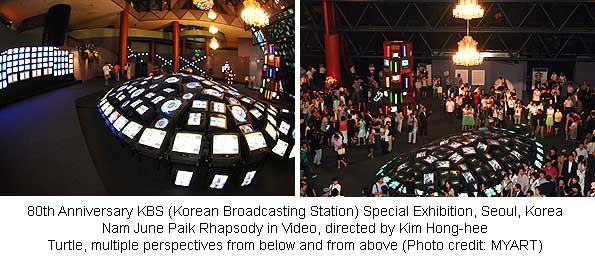
Gyeonggido Museum of Art
http://www.gma.or.kr/english/
80th Anniversary KBS (Korean Broadcasting Station) Special Exhibition
Nam June Paik Rhapsody in Video
Exhibition at Special Exhibition Hall in KBS New Bld., Yeoido, Seoul
July 27 – December 30, 2007
http://www.kbsnamjunepaik.com/
The 6th Gwangju Biennale 2006
Fever Variations
http://www.gb.or.kr/
#permalink posted by Mina Cheon: 8/09/07 10:13:00 PMThursday, July 12th, 2007
[youtube=http://www.youtube.com/watch?v=k4iH_lZV4Vs][youtube=http://www.youtube.com/watch?v=LRAjNEBF0Ic]
Subject: my James Fuentes story from last night
On Thu, July 12, 2007 2:55 am, JS wrote:
> Erika,
>
> Re: our convo last night about why James is interesting as an organizer
> because of the unusually open channel? I’m sending it to you here for the record.
>
> It was Emily who introduced me to James, I think it was at Bill Stones’
> show at Emily Harvey Gallery, the one with the head maze, such a great
> interactive work. No overkill making the whole body go through tight
> walls. Remember at Emily Harvey Gallery the drop ceiling over the office
> with a height of about 6 feet. Bill adapted it with a walk-in maze hanging
> from the ceiling that came down to about 5+ feet so you experienced the
> confinement from the neck up. It gave the entire opening, which was packed
> solid, a really crazy feel. In the midst of that opening Emily
> brought 20 something James over to meet me with an energy like, Josh, you’re cool, do
> something with James, I have collectors to entertain. I can’t remember
> what was up with Lance Fung Gallery at the time, I think this happened
> after “Five” so we were all in force. But, you know I had had that
> Personal Effects show with Emily and it had caused quite a lot to happen
> to me as an artist, I won’t go into the details – but Emily and I had a
> very good rapport about organization and energy.
>
> James had that Proustian quality of appearing as a small irregularity
> which promised to develop into a massive presence, my antennae were up. I
> found out that James had grabbed a store front on Broome Street and was
> doing a temporary gallery in the space. He was looking for artists. I was
> a bit puffed up at the time and I think I had a handful of shows that year
> already so I wasn’t really in the vein.
>
> A guy named Stephen was my business manager at the time. I met him at his
> office to go over careerist issues, he was quitting smoking. On his office
> wall were three really stunning graphic prints. When I asked Stephen about
> them he told me he had made them and thought they looked nice and put them
> up on the wall to decorate his space. He had no sense of himself as a
> visual artist, whatsoever. I asked how he made the work and he said, “oh,
> they are the filters from my air purifier, I’m such a heavy smoker and I
> have to keep the air clean for everyone else in the office, so I change
> them and they come out like this, they are beautiful.” “Stephen, you
> should consider showing these, you are making a work.” I said. He loved
> the idea, but was clueless. So I told him I was going to get him a show.
>
> I met with James at the desk in the back room of his temporary gallery on
> Broome Street and proposed putting Stephen up. I disclosed to James that
> Stephen was not a declared artist, just someone making these things for
> himself, that they were the filters from an air purifier, that Stephen was
> making them by smoking cigarettes and that James could activate this
> person with a show. James looked at documentation of the work (i had
> Stephen make slides of three pieces he had on his office wall) smiled and
> agreed and gave me a date for Stephen to have a show at James Fuentes
> Gallery.
>
> When I returned to Stephen I explained that there was the problem of
> installation and framing and that he should quickly produce enough of the
> pieces to adequately fill the space, which was not enormous, but required
> maybe 15 good works. Stephen says the problem is that each filter
> requires two months of chain smoking and the three on the wall are the
> only ones he has. Stephen proposes that he buy 15 air purifiers and smoke
> for another two months, but I explain he only has three weeks until the
> opening. For this reason I suggest that he contact the manufacturer of the
> air purifier to negotiate for the discarded test filters. For Stephen, who
> negotiates deals all day, its a natural – a week later he has a pile of
> these things and is simply holding them up one by one and selecting the
> ones he likes.
>
> Stephen went on to show with James and I believe, because James opened the
> venue to him, Stephen (who I’m out of touch with for years) showed with
> several other venues. I have one of Stephen’s pieces from James’ Broome
> Street gallery exhibition which I keep up to this day.
>
> J.
Emily Harvey Gallery selected exhibitions included:
Alison Knowles, Coco Gordon, Loose Pages, Emily Harvey Gallery(EHG), NYC, Feb 14, 1983
Eric Andersen, Visitors Walk (performance), EHG, NYC, Oct 30, 1983
Peter Van Riper, Portrait Triptychs, EHG, NYC, Nov 30, 1984
Valery Gerlovin, Rimma Gerlovina, N/A, EHG, NYC, Apr 19, 1985
Dorothee Selz, Eat-Art Event, EHG, NYC, Jun 19, 1985
Joel Ducorroy, License Plates Works, EHG, NYC, Oct 18, 1985
Eric Andersen, Please Leave (performance), EHG, NYC, Nov 22, 1985
Charlie Morrow, Citywave Copenhagen in New York, EHG, NYC, Jan 14, 1986
Alison Knowles, Malcolm Goldstein, Breath River Route (performance/installation), EHG, NYC, Mar 22, 1986
Dick Higgins, Arrow Paintings, Emily Harvey Gallery(EHG), NYC, Nov 7, 1986
Martin Richard+Richard Martel+Pieere-Andre Arcand, Performance, EHG, NYC, Nov 14, 1986
Ken Friedman, Fluxus Objects, Fluxus Clothes 1966-1986, EHG, NYC, Jan 8, 1987
Jacques Halbert, Projects for Paintings, EHG, NYC, Apr 24, 1987
Hans Breder, Ursonate 1986, EHG, NYC, May 1, 1987
Group, BY THE LETTER – A show of text in art –, EHG, NYC, May 19, 1987
Brendan Atkinson, Painting Money, EHG, NYC, Sep 25, 1987
Alison Knowles, Finger Book, EHG, NYC, Oct 23, 1987
Citizen Kafka, Citizen Sells Out, EHG, NYC, Nov 14, 1987
Piotr Rypson, Slide lecture on polish Futurism, EHG, NYC, Dec 3, 1987
Eric Andersen, Third Divertisement, EHG, NYC, Dec 5, 1987
Carolee Schneemann, Self Shot: Photographic Sequence & Video Installation, Emily Harvey Gallery(EHG), NYC, Jan 15, 1988
Eric Andersen, To Dick and Achilleus, EHG, NYC, Feb 21, 1988
Group, Extended Play , curated by Ursula Block & Christian Marclay, (Flexidisc Catalogue), EHG, NYC, Feb 12, 1988
Ken Friedman, Made in Finland, EHG, NYC, March 18, 1988
Larry Miller, Earthly Works, Emily Harvey Gallery(EHG), NYC, Apr 15, 1988
Jean Dupuy, WHERE, EHG, NYC, May 17, 1988
Group, A La Lettre , EHG, NYC, Jul 15, 1988
Ben Patterson, Ordinary Life, EHG, NYC, Sep 23, 1988
Eric Andersen, !Lo Lamentamos! !Fuera De Servicio!, EHG, NYC, Oct 21, 1988
Charlie Morrow, Wedding Event , EHG, NYC, Oct 23, 1988
Joel Ducorroy, New Work for New York, EHG, NYC, Oct 28, 1988
Group, Extra! Special Editions, EHG, NYC, Dec 6, 1988
Henry Flynt, Classic Modernism and Authentic Concept Art, EHG, NYC, Jan 27, 1989
Henry Flynt, Publication Party for lo no.14, Emily Harvey Gallery(EHG), NYC, Mar 3, 1989
Henry Flynt, Tape Concert – Hoedown, Glissando #1, EHG, NYC, Mar 9, 1989
Dick Higgins, Maps and More, EHG, NYC, Mar 17, 1989
Ay-o, Corner, Higgins, Knowles – Talk w/ Robert C. Morgan on Fluxus @ soho20 gallery, EHG, NYC, Apr 14, 1989
Yoshi Wada, a Sound Installation, EHG, NYC, Apr 21, 1989
Jean Dupuy, Special edition for Hypermetropes, EHG, NYC, May 16, 1989
Brian Buczak, a Memorial Exhibition, EHG, NYC, Jul 4, 1989
Ben Vautier, Art Does Not Exist, EHG, NYC, Sep 16, 1989
Eric Andersen, Call 212-431-7169, EHG, NYC, Oct 20, 1989
Ben Patterson, What Makes People Laugh, EHG, NYC, Oct 27, 1989
Group, Fluxus & CO, Emily Harvey Gallery(EHG), NYC, Dec 2
Alison Knowles, Seven Indian Moon – (Catalogue) , EHG, NYC, Jan 17, 1990
Charlotte Moorman, Child of the Cello, EHG, NYC, Feb 24, 1990
Christer Hennix, Metaxy: a Wall of Poetry & Fragrance (Perform
ance), EHG, NYC, Mar 18, 1990
Carolee Schneemann, Cycladic Imprints – a Kinetic Installation, EHG, NYC, Mar 23, 1990
Takako Saito, Games, EHG, NYC, Apr 20, 1990
Gerhard Ruhm & Franz Mon, Performance, EHG, NYC, Apr 25, 1990
Dick Higgins, Brown Paintings 1989 – 90, EHG, NYC, Sep 14, 1990
Eric Andersen, The Crying Place (Manhattan), EHG, NYC, Oct 26, 1990
Group, a Fluxus Group Show, EHG, NYC, Dec 14, 1990
Yoshi Wada, A Sound Installation, EHG, NYC, Feb 5, 1991
Henry Flynt, The Samo Graffiti, Emily Harvey Gallery(EHG), NYC, Mar 8, 1991
Albert Fine, 1932 – 1987 (curated by Christian Xatrec), EHG, NYC, Apr 19, 1991
Charlie Doria, an Evening of Poetry & Performance, EHG, NYC, May 31, 1991
Ben Vautier, For a Pluri-Cultural Avant-Garde World – (Catalogue), EHG, NYC, Sep 24, 1991
Ben Vautier, Talk about his statements on ethnies, EHG, NYC, Oct 24, 1991
Giordano Bruno Publish party w/ Dick Higgins, Charlie Doria, EHG, NYC, Oct 29, 1991
Ay-o, Ay-o’s Blackhole, EHG, NYC, Nov 1, 1991
Group, Music for Eye & Ear, EHG, NYC, Dec 4, 1991
Philip Corner, Pieces of Reality, EHG, NYC, Jan 31, 1992
Alison Knowles, Bread & Water, EHG, NYC, Mar 13, 1992
Henning Christiansen, I am a Bird…, EHG, NYC, Apr 24, 1992
Orlan, Lecture, Emily Harvey Gallery(EHG), NYC, Apr 29, 1992
Group, 10 years on Broadway – 1982-1992, EHG, NYC, Sept 18, 1992
Sari Dienes, Rubbing, EHG, NYC, Nov 24, 1992
Henry Flynt, Concept Art, Modern Art and Fantasy, EHG, NYC, Feb 5, 1993
Ay-o, Some Hanging Pieces, EHG, NYC, Mar 19, 1993
Dick Higgins, Natural Histories, EHG, NYC, Apr 23, 1993
Peter Van Riper w/ Setsuko Konishi, Performance, EHG, NYC, May 21, 1993
Alain Arias-Misson, Publish Party, EHG, NYC, Nov 12, 1993
Frances Whitney, Sculpted Light, EHG, NYC, Feb 11, 1994
Joshua Selman, Personal Effects, Emily Harvey Gallery(EHG), NYC, Mar 11, 1994
Kirsten Justesen, Surfacing, EHG, NYC, Apr 22, 1994
Ay-o, Some Hanging Pieces no.10, EHG, NYC, Sep 26, 1996
Ben Patterson, Blame it on Pittsburgh, EHG, NYC, Jan 30, 1997
Emmett Williams, Fresh Impressionism, EHG, NYC, Apr 8, 1997
Alison Knowles, Sea Change, EHG, NYC, Oct 3, 1997
Alain Arias Misson, Shamanix!, EHG, NYC, Apr 9, 1998
Al Hansen, (curated by Gracie Mansion), EHG, NYC, Sep 16, 1998
Al Hansen, Performances (organized by Gracie Mansion), EHG, NYC, Sep 18, 1998
Geoff Hendricks, Sky Notes 1 – 22, EHG, NYC, Jan 29, 1999
Bill Stone, Musings & Ruminations, EHG, NYC, Apr 7, 1999
Jessica Higgins, How it sometimes goes in Kangaroo land, Emily Harvey Gallery (courtesy Lance Fung Gallery,) NYC, Sep 9, 1999
Larry Miller, Genesthetics, EHG, NYC, Oct 8, 1999
Carolee Schneemann, Vespers Pool, EHG, NYC, Jan 27, 2000
Daniel Spoerri, La Cabinet Anatomique – (Catalogue), EHG, NYC, May 11, 2000
Alison Knowles, Footnotes, EHG, NYC, Oct 5, 2000
Alain Arias-Misson, Little Shamani , EHG, NYC, Feb 1, 2001
Christian Xatrec – (Catalogue), EHG, NYC, Apr 12, 2001
Ay-o, Tits Mandala, EHG, NYC, Oct4, 2001
Fluxus Concert (Beginning of Rainbow), EHG, NYC, Nov 3, 2001
Henry Flynt, Musical Recordings Publication Party, EHG, NYC, Nov 4, 2001
Emmett Williams, The Boy & the Bird, screening at Anthology Film Archive, Emily Harvey Gallery(EHG), NYC, Apr 6, 2002
Emmett Williams, Story lines, EHG, NYC, Apr 10, 2002
Berty Skuber, Under Penalty of Law – (Catalogue), EHG, NYC, Oct 3, 2002
Geoff Hendricks, Accidental Significance (Collaboration with Brian Buczak), EHG, NYC, Oct 9, 2003
Jean Dupuy, Looking at Stones – (Catalogue), EHG, NYC, Feb 26, 2004
#permalink posted by Artist Organized Art: 7/12/07 09:39:00 PMThursday, July 12th, 2007
WILLIAM STONE AT JAMES FUENTES LLC, 2007
On 7/8/07 1:32 AM, JS wrote:
> Also, is it possible to get a shot of the outside of
> the gallery and a little something on the social club history? I could imagine
> Bill’s show being the interior shots with captions for the pieces, a paragraph
> on Bill and then a little history of the gallery and then a history of James’
> organizational approach.
>
> Bill thought an interview between him and James would be good. That’s another
> interesting direction. Who’s going to be the writer? It should be an artist.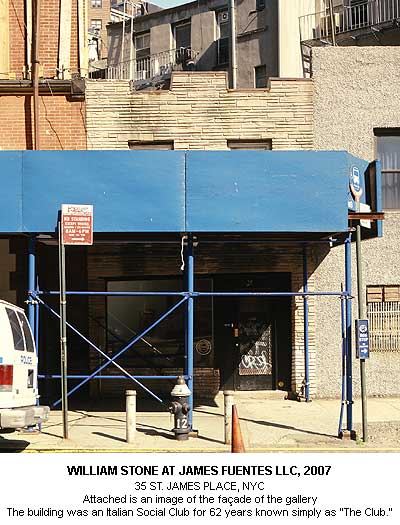
AOA: Can you give us a paragraph about your organizational approach to obtaining gallery spaces and structuring art events? JF: The program consists of artists that have shaped and propelled my career from the start. I can safely say I would be in another line of work were it not for crossing paths with these artists. There is a core group of 6 or 7 and the other half of the program is one off project based exhibitions. When I came across this new gallery space, I had no desire to-reopen a gallery at the time. My lease was up on my apartment on Canal Street in Chinatown, I wanted to stay in that neighborhood so I scoured downtown for “for rent by owner” signs. I took a wrong turn on the way to Tribeca and that is when I happened on St. James Place and this odd looking building. When I looked through the storefront window that late night, I imagined it activated by people and art, I could see it very vividly. The sign said there was an apartment upstairs too, so it was a win win situation.
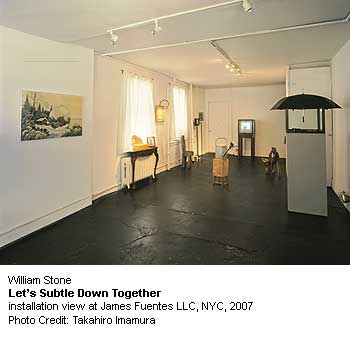
AOA: How does Bill fit into your overall program of organization. How do you feel about allowing artists that work with you into your organizational process?
JF: Bill Stone’s approach, which is reflective on the mediums he utilizes, rife with metaphor and poetry, like a magic trick, and seamlessly executed compliments the program but also provides a really significant anchor as it’s informed by close to two decades of exhibition experience. An artist who showed prior to Bill for instance was astounded by how he was able to transform the space. I have a good feeling that the dialogue between the artists in the program and the community surrounding the gallery is destined to create something great that I can¹t fully explain, in fact that’s already the case.
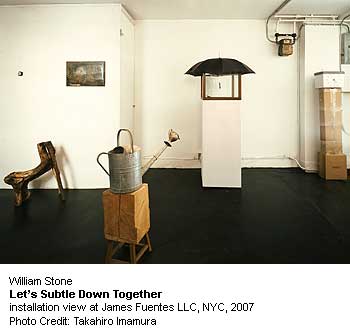
James Fuentes LLC is currently located south of the Bowery and borders City Hall, South Street Seaport, Wall Street, Tribeca and Chinatown but exists within an almost autonomous zone that stands as the last remaining working class enclave in downtown New York. One of the important contexts that the gallery provides is being reflective of the community that it is situated in. The program also reflects the social and political environments of its time, is conceptually rigorous yet aesthetically accessible and embraces a multidisciplinary approach to art. Stone’s practice is steeped in poetics and mechanics resulting in works that enhance perceptual possibilities, giving the most familiar objects new meaning. His exhibition at James Fuentes LLC consisted of new sculptures including altered readymades, fabricated readymades and works that address the core of functionality, exhibition and design in a subversive manner. His approach to the space was responsive to the gallery¹s architecture utilizing inherent fixtures ranging from the tenement windows, radiator and electrical conduit and exterior.
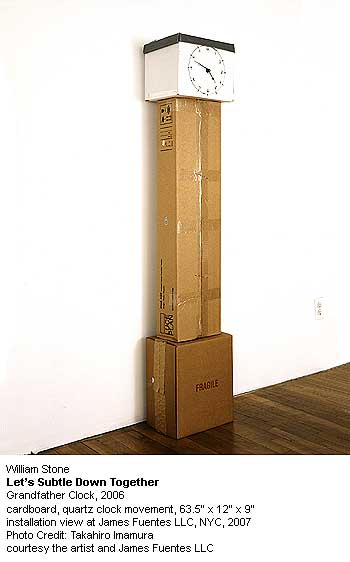
JF: It was important for Stone to be one of the first exhibitions at the new gallery as he was chosen to create the last exhibition for my first gallery closed in 2000. You can find a video of that project on this page which includes images, press and biographical information: http://www.jamesfuentes.com/artists_pages/stone_frameset.htm
#permalink posted by Artist Organized Art: 12:09:00 PM









